- Home
- Jennifer Niven
All the Bright Places Page 5
All the Bright Places Read online
Page 5
I love the world that is my room. It’s nicer in here than out there, because in here I’m whatever I want to be. I am a brilliant writer. I can write fifty pages a day and I never run out of words. I am an accepted future student of the NYU creative writing program. I am the creator of a popular Web magazine—not the one I did with Eleanor, but a new one. I am fearless. I am free. I am safe.
I can’t decide which of the Brontë sisters I like best. Not Charlotte, because she looks like my fifth-grade teacher. Emily is fierce and reckless, but Anne is the one who gets ignored. I root for Anne. I read, and then I lie for a long time on top of my comforter and stare at the ceiling. I have this feeling, ever since April, like I’m waiting for something. But I have no idea what.
At some point, I get up. A little over two hours ago, at 7:58 p.m., Theodore Finch posted a video on his Facebook wall. It’s him with a guitar, sitting in what I guess is his room. His voice is good but raw, like he’s smoked too many cigarettes. He’s bent over the guitar, black hair falling in his eyes. He looks blurry, like he filmed this on his phone. The words of the song are about a guy who jumps off his school roof.
When he’s done, he says into the camera, “Violet Markey, if you’re watching this, you must still be alive. Please confirm.”
I click the video off like he can see me. I want yesterday and Theodore Finch and the bell tower to go away. As far as I’m concerned, the whole thing was a bad dream. The worst dream. The worst nightmare EVER.
I write him a private message: Please take that off your wall or edit out what you say at the end so no one else sees/hears it.
He writes back immediately: Congratulations! I deduce by your message that you’re alive! With that out of the way, I was thinking we should probably talk about what happened, especially now that we’re partners on this project. (No one will see the video but us.)
Me: I’m fine. I’d really like to drop it and forget the whole thing ever happened. (How do you know that?)
Finch: (Because I only started this page as an excuse to talk to you. Besides, now that you’ve seen it, the video will self-destruct in five seconds. Five, four, three, two …)
Finch: Please refresh the page.
The video is gone.
Finch: If you don’t want to talk on Facebook, I can just come over.
Me: Now?
Finch: Well, technically in, like, five or ten minutes. I should get dressed first, unless you prefer me naked, and we have to allow for driving time.
Me: It’s late.
Finch: That depends on who you ask. See, I don’t necessarily think it’s late. I think it’s early. Early in our lives. Early in the night. Early in the new year. If you’re counting, you’ll notice the earlys outnumber the lates. It’s just to talk. Nothing more. It’s not like I’m hitting on you.
Finch: Unless you want me to. Hit on you, I mean.
Me: No.
Finch: “No” you don’t want me to come over? Or “no” you don’t want me hitting on you?
Me: Both. Either. All of the above.
Finch: Okay. We can just talk at school. Maybe across the room during geography, or I can find you at lunch. You eat with Amanda and Roamer, am I right?
Oh my God. Make it stop. Make him go away.
Me: If you come over tonight, do you promise to drop it once and for all?
Finch: Scout’s honor.
Me: Just to talk. Nothing more. And you don’t stay long.
As soon as I write it, I want to take it back. Amanda and her party are just around the corner. Anyone might come by and see him here.
Me: Are you still there?
He doesn’t answer.
Me: Finch?
FINCH
Day 7 of the Awake
I climb into my mom’s old Saturn VUE, better known as Little Bastard, and head to Violet Markey’s on the farm road that runs parallel to National Road, the main artery that cuts through town. I slam my foot against the gas pedal, and there’s the rush as the speedometer climbs to sixty, seventy, eighty, ninety, the needle shaking the higher it gets, the Saturn doing its best in that moment to be a sports car instead of a five-year-old minivan.
On March 23, 1950, Italian poet Cesare Pavese wrote: “Love is truly the great manifesto; the urge to be, to count for something, and, if death must come, to die valiantly, with acclamation—in short, to remain a memory.” Five months later, he walked into a newspaper office and chose his obituary photograph from the photo archive. He checked himself into a hotel, and days later an employee found him stretched out on the bed, dead. He was fully dressed except for his shoes. On the bedside table were sixteen empty packets of sleeping pills and a note: “I forgive everyone and ask forgiveness of everyone. OK? Not too much gossip, please.”
Cesare Pavese has nothing to do with driving fast on an Indiana farm road, but I understand the urge to be and to count for something. While I’m not sure taking off your shoes in a strange hotel room and swallowing too many sleeping pills is what I would call dying valiantly and with acclamation, it’s the thought that counts.
I push the Saturn to ninety-five. I will ease off only when I reach one hundred. Not ninety-seven. Not ninety-eight. It’s one hundred or nothing.
I lean forward, like I’m a rocket, like I. Am. The. Car. And I start yelling because I’m getting more awake by the second. I feel the rush and then some—I feel everything around me and in me, the road and my blood and my heart beating up into my throat, and I could end right now, in a valiant acclamation of crushed metal and explosive fire. I slam the gas harder, and now I can’t stop because I am faster than anything on earth. The only thing that matters is the forward thrust and the way I feel as I hurtle toward the Great Manifesto.
Then, in that exact, precise fraction of a moment before my heart might explode or the engine might explode, I lift my foot up and off and go sailing across the old, rutted pavement, Little Bastard carrying me on its own as we fly up over the ground and land hard, several feet away, half in, half out of the ditch, where I sit catching my breath. I hold up my hands and they aren’t shaking at all. They’re steady as can be, and I look around me, at the starry sky and the fields, and the dark, sleeping houses, and I’m here, motherf—–s. I am here.
Violet lives one street away from Suze Haines in a large white house with a red chimney in a neighborhood on the opposite side of town. I roll up in Little Bastard, and she’s sitting on the front step, wrapped in a giant coat, looking small and alone. She jumps up and meets me halfway down the sidewalk, then immediately glances past me like she’s looking for someone or something. “You didn’t need to come all the way over here.” She’s whispering, as if we might wake up the neighborhood.
I whisper back, “It’s not like we live in L.A. or even Cincinnati. It took me, like, five minutes to get here. Nice house, by the way.”
“Look, thanks for coming, but I don’t need to talk about anything.” Her hair is pulled back in a ponytail, and wisps of it are falling down around her face. She tucks a piece behind her ear. “I’m totally fine.”
“Never bullshit a bullshitter. I know a cry for help when I see one, and I’d say being talked off a ledge overqualifies. Are your parents home?”
“Yes.”
“Too bad. Want to walk?” I start walking.
“Not that way.” She pulls on my arm and drags me in the other direction.
“Are we avoiding something?”
“No. It’s just, uh—nicer over here.”
I put on my best Embryo voice. “So, how long have you been having these suicidal feelings?”
“God, don’t talk so loud. And I’m not … I’m not …”
“Suicidal. You can say it.”
“Well, anyway, I’m not.”
“Unlike me.”
“That’s not what I meant.”
“You were up on the ledge because you didn’t know where else to turn and what else to do. You’d lost all hope. And then, like a gallant knight, I saved your life. By th
e way, you look totally different without makeup. Not bad necessarily, but different. Maybe even better. So what’s up with this website of yours? Have you always wanted to write? Tell me about yourself, Violet Markey.”
She answers like a robot: There’s not much to say. I guess so. There’s nothing to tell.
“So, California. That must have been a change for you. Do you like it?”
“Like what?”
“Bartlett.”
“It’s all right.”
“What about this neighborhood?”
“It’s all right too.”
“These are not the words of someone who just had her life handed back to her. You should be on top of the f—ing world right now. I’m here. You’re here. Not only that, you’re here with me. I can think of at least one girl who’d want to trade places with you.”
She makes this frustrated (and strangely hot) arrrrrr sound. “What do you want?”
I stop under a streetlight. I drop the fast talk and the charm. “I want to know why you were up there. And I want to know that you’re okay.”
“If I tell you, will you go home?”
“Yes.”
“And never bring it up again?”
“That depends on your answers.”
She sighs and starts to walk. For a while she doesn’t say anything, so I stay quiet, waiting her out. The only sounds are someone’s television and a party somewhere in the distance.
After several blocks of this, I say, “Anything you tell me stays between us. You might not have noticed, but I’m not exactly swimming in friends. And even if I was, it wouldn’t matter. Those assholes have enough to gossip about.”
She takes a breath. “When I went to the tower, I wasn’t really thinking. It was more like my legs were walking up the stairs and I just went where they took me. I’ve never done anything like that before. I mean, that’s not me. But then it was like I woke up and I was on that ledge. I didn’t know what to do, so I started to freak out.”
“Have you told anyone what happened?”
“No.” She stops walking, and I resist the urge to touch her hair, which blows across her face. She pushes it out of the way.
“Not your parents?”
“Especially not my parents.”
“You still didn’t tell me what you were doing up there.”
I don’t actually expect her to answer, but she says, “It was my sister’s birthday. She would have been nineteen.”
“Shit. I’m sorry.”
“But that isn’t why. The why is that none of it matters. Not school, not cheerleading, not boyfriends or friends or parties or creative writing programs or …” She waves her arms at the world. “It’s all just time filler until we die.”
“Maybe. Maybe not. Whether it’s filler or not, I’m pretty glad to be here.” If there’s anything I’ve learned, it’s that you need to make the most of it. “It mattered enough for you not to jump.”
“Can I ask you something?” She is studying the ground.
“Sure.”
“Why do they call you Theodore Freak?”
Now I’m studying the ground like it’s the most interesting thing I’ve ever seen. It takes me a while to answer because I’m trying to decide how much to say. Honestly, Violet, I don’t know why the kids don’t like me. Lie. I mean, I know but I don’t. I’ve always been different, but to me different is normal. I decide on a version of the truth.
“In eighth grade, I was a lot smaller than I am now. That was before your time, before you got here.” I look up long enough to see her nod her head. “Ears stuck out. Elbows stuck out. My voice didn’t drop till the summer before high school, when I shot up fourteen inches.”
“That’s all?”
“That and sometimes I say and do things without thinking. People don’t like that.”
She’s quiet as we round a corner, and I can see her house in the distance. I walk slower, buying us more time. “I know the band playing down at the Quarry. We could head over there, get warm, listen to music, forget about everything. I also know a place with a pretty awesome view of the town.” I shoot her one of my better grins.
“I’m going inside and going to sleep.”
I’m always amazed by people and their sleep. I wouldn’t ever sleep if I didn’t have to.
“Or we can make out.”
“That’s okay.”
A minute or so later, we’re at my car. “How’d you get up there, anyway? The door was open when I tried it, but it’s usually sealed tight.”
She smiles for the first time. “I might have picked the lock.”
I whistle. “Violet Markey. There’s more to you than meets the eye.”
In a flash, she is up the walk and inside her house. I stand watching until a light flicks on in an upstairs window. A shadow moves in front of it so that I can see the outline of her, as if she’s watching me through the curtain. I lean back against the car, waiting to see who gives in first. I stay there until the shadow moves away and the light goes off.
At home, I park Little Bastard in the garage and start my nightly run. Run in winter, swim the rest of the year. My regular route is down National Road, out past the hospital and Friendship Campground to this old steel bridge that seems forgotten by everyone but me. I sprint across the tops of its walls—the ones that act as guardrails—and when I make it without falling, I know I’m alive.
Worthless. Stupid. These are the words I grew up hearing. They’re the words I try to outrun, because if I let them in, they might stay there and grow and fill me up and in, until the only thing left of me is worthless stupid worthless stupid worthless stupid freak. And then there’s nothing to do but run harder and fill myself with other words: This time will be different. This time, I will stay awake.
I run for miles but don’t count them, passing dark house after dark house. I feel sorry for everyone in this town who’s sleeping.
I take a different route home, over the A Street Bridge. This bridge has more traffic because it links downtown with the west side of Bartlett, where the high school is and the local college is and all these neighborhoods are, growing up in between.
I run past what’s left of the stone guardrail. There is still an angry hole in the middle where the rest of the wall used to be, and someone has placed a cross beside it. The cross lies on its side, white paint faded gray from the Indiana weather, and I wonder who put it there—Violet? Her parents? Someone from school? I run to the end of the bridge and cut onto the grass, down the embankment to the bottom, which is an old dried-up riverbed full of cigarette butts and beer bottles.
I kick through the trash and the rocks and the dirt. Something shines silver in the dark, and then I see other shining things—pieces of glass and metal. There is the red plastic eye of a taillight. The shattered lump of a side mirror. A license plate, dented and nearly folded in half.
All of this makes it suddenly real. I could sink like a stone into the earth and be swallowed whole by the weight of what happened here.
I leave everything as it was, except for the license plate, which I take with me. Leaving it there seems wrong, as if it’s too personal a thing to sit out in the open where someone who doesn’t know Violet or her sister might take it and think it’s cool, or collect it as a souvenir. I run toward home, feeling both heavy and hollowed out. This time will be different. This time, I will stay awake.
I run until time stops. Until my mind stops. Until the only thing I feel is the cold metal of the license plate in my hand and the pounding of my blood.
VIOLET
152 days till graduation
Sunday morning. My bedroom.
The EleanorandViolet.com domain name is expiring. I know this because the hosting company has sent me an email with a warning that says I must renew now or let it go forever. On my laptop, I open our folders of notes and sort through all the ideas we were working on before last April. But they’re only fragments that don’t make sense without Eleanor here to help me decipher he
r shorthand.
The two of us had different views on what we wanted the magazine to be. Eleanor was older (and bossier), which meant she was usually in charge and usually got her way. I can try to salvage the site, maybe revamp it and turn it into something else—a place where writers can share their work. A place that isn’t about just nail polish and boys and music, but other things too, like how to change a tire or how to speak French or what to expect once you get out into the world.
I write these things down. Then I go onto the site itself and read the last post, written the day before the party—two opposite takes on the book Julie Plum, Girl Exorcist. Not even The Bell Jar or Catcher in the Rye. Nothing important or earth-shattering. Nothing that says: This is the last thing you will ever write before the world changes.
I delete her notes and mine. I delete the hosting company email. And then I empty my trash so that the email is as dead and gone as Eleanor.
FINCH
Day 8 of the Awake
On Sunday evening, Kate and Decca and I drive to my dad’s new house in the more expensive part of town for Weekly Obligatory Family Dinner. I’m wearing the same plain navy shirt and khakis I always wear when I see my father.
We are silent on the way over, each of us staring out the window. We don’t even play the radio. “Have fun over there,” Mom said before we left, trying to be cheerful, when I know that the second the car hit the street, she was on the phone to a girlfriend and opening a bottle of wine. It’ll be my first time seeing my dad since before Thanksgiving and my first time in his new home, the one he shares with Rosemarie and her son.
They live in one of these colossal brand-new houses that look like every other house up and down the street. As we pull up out front, Kate says, “Can you imagine trying to find this place drunk?”

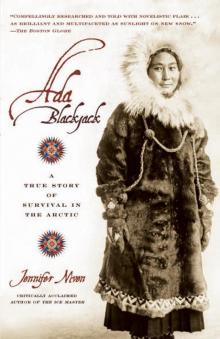 Ada Blackjack: A True Story of Survival in the Arctic
Ada Blackjack: A True Story of Survival in the Arctic The Aqua Net Diaries: Big Hair, Big Dreams, Small Town
The Aqua Net Diaries: Big Hair, Big Dreams, Small Town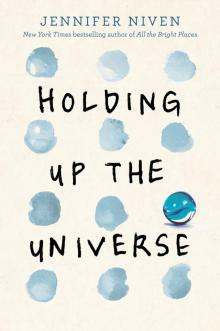 Holding Up the Universe
Holding Up the Universe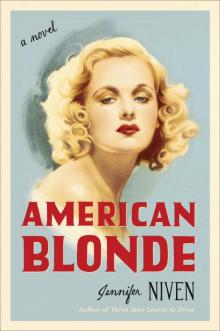 American Blonde
American Blonde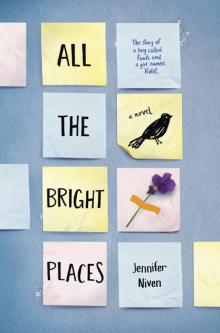 All the Bright Places
All the Bright Places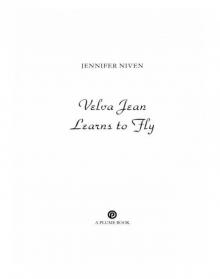 Velva Jean Learns to Fly
Velva Jean Learns to Fly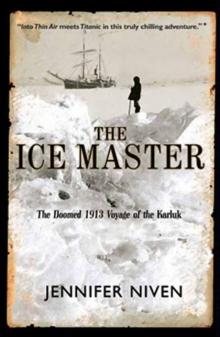 The Ice Master
The Ice Master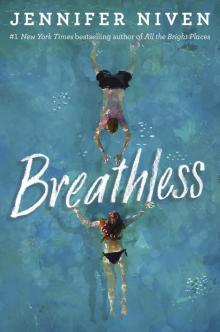 Breathless
Breathless The Aqua Net Diaries
The Aqua Net Diaries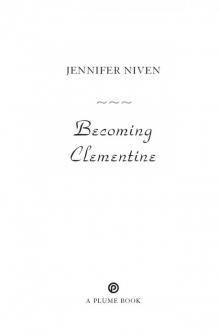 Becoming Clementine: A Novel
Becoming Clementine: A Novel